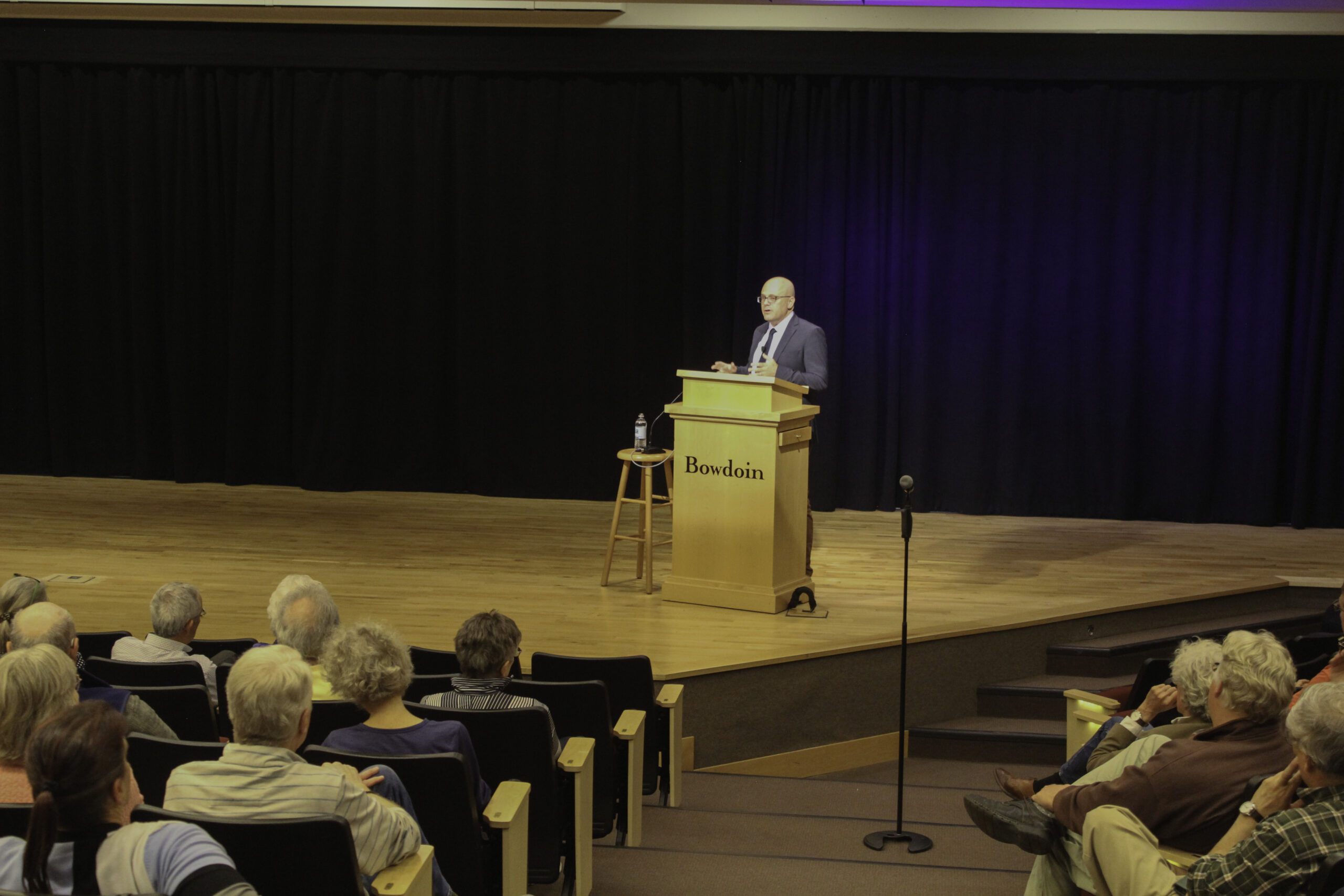David Ziblatt discusses democratic backsliding and U.S. political institutions
October 25, 2024
 Carolina Weatherall
Carolina WeatherallOn Monday afternoon in Kresge Auditorium, Daniel Ziblatt, professor of the science of government at Harvard University, delivered a lecture as part of the Office of Inclusion and Diversity’s fall speaker series titled, “Tyranny of the Minority? How American Democracy Can Defend Itself.”
Ziblatt began the talk by outlining the context of democratic backsliding in the United States. Non-profit advocacy organization Freedom House’s annual report on the state of democracy gave the United States a 94/100 in 2008. This year, however, the United States received only a 83/100, slipping to the same level as Panama and Romania. Ziblatt also discussed the uptick in political violence, threats against election workers, increasing distrust of institutions and political polarization.
According to Ziblatt, no nation with an established democracy over the age of 50 or a GDP per capita over $17,000 has experienced a democratic collapse.
“So in this sense, the crisis of American democracy really raises a genuine puzzle for social scientists, and it’s something that, again, we’re living through,” Ziblatt said.
Ziblatt proposed two explanations for the United States’s democratic backsliding: the Republican Party’s disregard for the democratic rules and the political institutions in the United States.
According to Ziblatt, Spanish political scientist Juan Linz outlined three rules for a democracy to function. Political parties must unambiguously accept the results of elections, reject the use of political violence and attempts to illegitimately gain power and break completely with anti-democratic extremists in their own camp. Within the framework, Ziblatt argued forces could be grouped into democratic loyalists, semi-loyalists and anti-democratic forces, and whether semi-loyalists backed democratic or anti-democratic forces often proved decisive.
“The tragedy of this kind of behavior of semi-loyalty is that the semi-loyalists usually aren’t people trying to kill democracy.” Ziblatt said “They’re usually just ordinary politicians … trying to stave off a challenge to their own leadership. They have their own political ambitions.”
Ziblatt characterized the leaders of the Republican party as semi-loyalists and argued their passivity has further strengthened anti-democratic forces.
“It’s pretty clear the assault on Congress, January 6, 2021, was a violent threat to democracy but also crucial was how political leaders responded to this,” Ziblatt said. “They tried to talk out of both sides of their mouths about it. Initially, there was condemnation of it, but it faded. And this was the kind of classic, semi-loyal behavior.”
Ziblatt then argued that the political institutions of the government help to keep radical right and populist parties in power. Similarly to Europe, around 30 to 35 percent of the American electorate typically votes for radical right and populist parties.
“What’s problematic for the United States is not the voters. Our voters are very similar to voters in other countries. That’s a broad similarity. What makes the United States distinctive are our political institutions,” Ziblatt said.
Historical and geographic trends have led to supporters of radical right and populist parties now residing primarily in rural areas, giving them an advantage with the United States’s electoral institutions.
“It’s only really in the 21st century that U.S. parties have so clearly split on urban and rural lines, in which the Democrats are primarily the party of urban areas. Republicans are primarily based in sparsely populated areas, which means that this rural bias now gives the Republican Party a systematic advantage in the Electoral College, the Senate and the Supreme Court, which allows them to win power,” Ziblatt said.
Counter-majoritarian institutions such as the Electoral College should be replaced by the popular vote, Ziblatt said. He also argued for abolishing gerrymandering and instituting term limits for Supreme Court justices.
“Those with more votes should prevail over those with fewer votes in determining who holds political office. I really have a hard time thinking of any theory of democracy that would justify any other outcome. Office holdings should really reflect how people vote,” Ziblatt said. “So, institutions that prevent electoral majorities from winning or prevent electoral majorities from actually governing aren’t essential to democracy. They’re, in fact, antithetical to democracy.”
Attendee Noah Rossin ’27, said he left without any clear ideas as to what the next steps forward should be.
“I was a little bit unsatisfied with his final recommendations. I also wish that after giving so much detailed explanation, he gave a bit more detail in the solution aspect,” Rossin said.

Comments
Before submitting a comment, please review our comment policy. Some key points from the policy: